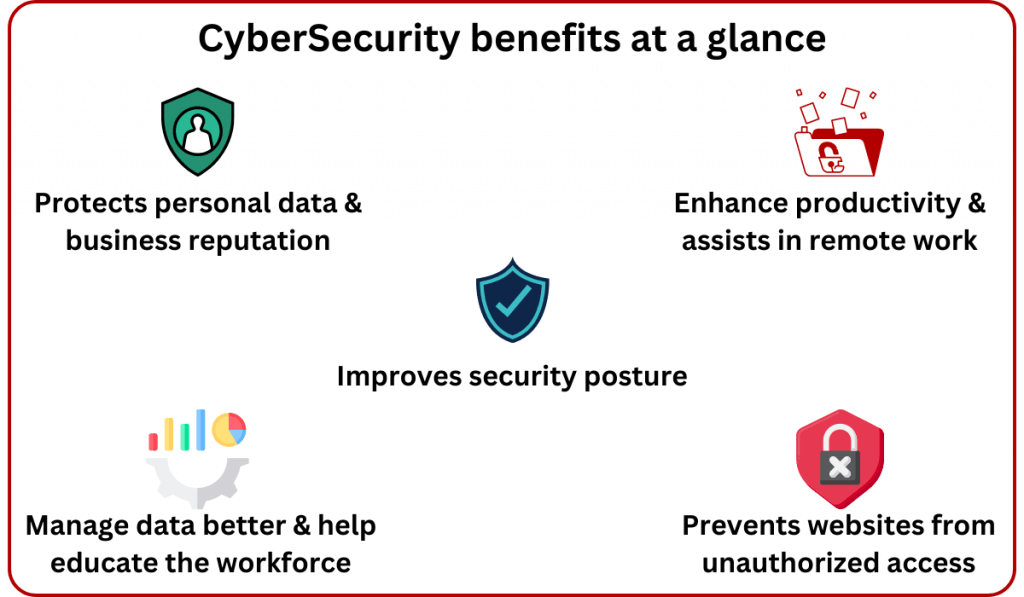In the modern world, where technology changes daily, keeping our online presence safe is very important because crimes happen more on the internet than in real life. For example, phishing and internet scams have become routine.
So, to combat these security breaches, people utilize cybersecurity technology. But, what is this technology, and how can it be helpful to you?
In this guide, you will learn the common pros-cons of cybersecurity technology and how it affects both websites and organizations.
Let’s get started.
📌 Table of Contents
What is cybersecurity?
Cybersecurity or IT security is the security of important online data from malicious software, viruses, and cybercriminals.
When we use cybersecurity for personal computers, we simply call it computer security.
The primary aim of implementing cyber security technology is to lower the chances of cyber attacks and protect valuable data in the servers and networks. Several companies provide this service, and to protect your personal computer, you can use antivirus programs like Kaspersky, Quick Heal, etc.
Without further ado, let’s check the advantages and disadvantages of using cybersecurity technology.
📌 Related resources on cyber security:
- Understand shimming in cyber security?
- What is cloning in cyber security?
- Pros and cons of spooling in cyber security
What are the advantages and disadvantages of cybersecurity?
Any technology that comes with human help has advantages and its fair share of disadvantages. So, it is the same with cybersecurity.
Pros of cybersecurity
Let’s list the potential benefits of using cybersecurity software.

1. Protects personal data and business reputation
In today’s world of the internet, keeping your online identity safe is a massive problem. We see data leaks and phishing happening now and then. So, what should you do to stop these activities? Should you stop using the internet?
Instead, you should get yourself a good antivirus program for personal use or contact a cybersecurity company to provide security for your company’s online servers.
High-quality antivirus software helps keep dangerous viruses like Trojans and malware at bay. Thus, your computer’s health isn’t compromised. When it comes to your business, a significant cyber attack may destroy its image in the public’s eye. Keeping your customer’s data safe should be a big priority for any business that stores information.
2. Enhance productivity and assists in remote work
With increasing technology, cybercriminals are coming up with new and modern ways to hack into your computer and extract data. These viruses pose a massive problem in the usual workflow and a barrier to productivity. Cybersecurity solutions will help keep these unwanted viruses at bay and help you and your work stay efficient.
Remote work requires a free flow of information which can sometimes be classified and sensitive using the internet. If cyber criminals catch this information, they can leak it. Therefore, businesses should be aware of this potential situation and safeguard themselves using a well-established cybersecurity platform.
📌 Find top cyber security companies based in India
3. Maintain compliance with regulations and improve cyber posture
Many regulatory bodies, like PCI DDS, SOX, GDPR, HIPAA, etc., play a substantial role in protecting the data of users and companies. EU_GDPR makes it mandatory for all businesses to invest in cybersecurity platforms. These are excellent steps that all regulatory bodies should take.
However, businesses should take cybersecurity solutions that are reliant and resilient. These applications should include a firewall, protection against viruses, anti-spam, and wireless security, which helps keep the standard workflow of businesses intact.
Maintaining a cyber posture means you are aware of the possible threats that your organization may be subjected to. Safeguarding your organization’s data with an excellent cybersecurity platform helps give employees the flexibility and liberty to use the internet.
In addition, outsourcing the data security work to another company helps you automate work at the cost of a few bucks.
4. Manage data better and educate the workforce
When analyzing something for the business, the data should be centralized, i.e., getting all the data in one place. It helps in increasing operational efficiency.
Thus, no one would want a virus deleting an important file and becoming unrecoverable or making the file corrupt.
These viruses can also cause data breaches and put your sensitive information at risk. To avoid these unwanted and complicated situations, the business should contact a cybersecurity company and safeguard its data.
Viruses, malware, phishing, online scams, etc., are topics many people worldwide aren’t entirely aware of.
Securing your business’s data using cybersecurity platforms will better help your workforce know about data breaches and online security.
5. Maintain trust and prevent websites from crashing
Reports of data breaches and data leaks don’t look in the eyes of the public, especially if your company has made a good name for itself.
In 2021, Facebook faced data breach issues that affected the company’s online reputation and users’ trust.
This way, protecting your data from these cybercriminals helps save your company’s reputation.
Also, cyber security prevents websites and online stores from virus infection to steal customers’ data.
It also causes the website to crash at times. To prevent these regular website crashes and to lose out on potential customers, you should have an SSL certificate and a good antivirus program to keep the website clean and free from viruses and malware.
Cons of cybersecurity
Now, let’s uncover the common disadvantages or drawbacks of cybersecurity technology.
1. High expense
For a company to be profitable, it has to manage its expenses efficiently. You can never implement new technologies if the finances don’t allow it. Unfortunately, deploying cybersecurity doesn’t come cheap like any other new technology. It is one of the many disadvantages of cybersecurity for a company.
Due to the expensive nature of implementing the technology, many low-budget companies or startups refrain from using the same. Sometimes they implement cheaper versions of the system, which don’t provide enough security and the company’s valuable data faces jeopardy.
In general, Cybersecurity is mostly suitable for large businesses with enough financial power, not for small startups.
2. Complications
To implement and correctly understand everything about cybersecurity frameworks, the company needs to put in a lot of time and effort. Moreover, the new-age features can be challenging for some companies to understand.
The complications create many problems for new and established businesses.
If the business doesn’t understand the platform and software entirely and correctly, it may lead to severe issues like data breaches and leaks.
So, any company implementing cybersecurity must know the platform inside out and let all the employees know about it.
3. Constant monitoring
After implementing the system, the company must keep a keen eye on it and monitor it constantly. At times this adds to the company’s expense as there may be the need for a separate team to handle the work.
In addition, it will again require a lot of time and effort to find recruits, train them with the system, and make them known to the company culture and ethos.
You always need to keep the system updated because new types of viruses are always on release, and the system may not be capable of reacting to those attacks.
4. Not a one-time project
Now you know that implementing cybersecurity in a company isn’t a one-time thing. You can’t just install it and forget about it. Constant monitoring, keeping the system updated, and checking if any virus has infected the system a part of the game.
5. Associated risks
Now, deploying a cybersecurity system can be highly risky for many businesses. For example, the sales team of a not-so-known cybersecurity company can pitch you their best sales pitch and get you brainwashed into buying their system. But, then, you know that the system was useless to your company because its performance isn’t up to the mark.
Financial risk is also associated with the system’s deployment for big and small-budget companies. It can be an even more significant risk for startups.
Before implementing a cybersecurity system, you should analyze the risk first and only then buy it.
📌 Relevant article on cyber security: Top cyber security documentaries to watch
Is cyber security hard to learn?
Anything that provides you with knowledge will be hard to learn. However, if you have a keen vision of crafting a career outside the industry, you will not face many difficulties.
It boils down to how much you want to learn and how deep you want to go into it. Keep in mind the many pros and cons of cybersecurity.
To answer the question, ‘is cyber security a good career?’.
Yes, it is a good career choice for people interested in computers, ethical hacking, combating computer viruses, and coding. The field doesn’t require you to know coding at the entry-level level, but with promotions, you may need to learn it. The subject isn’t tough to learn if you have an idea about what you are stepping into and have a keen interest in the subject.
Final words
Cybersecurity is the need of the hour for any company dealing with matters online. It is essential to keep your company’s and customers’ data safe. When we talk about career opportunities, the field gives you many opportunities to shine and reap the benefits of working in cyber security.
If you haven’t implemented cybersecurity, you should opt for it before it’s too late.
CyberSecurity FAQs
Is Cybersecurity a promising career?
Statista predicts that the cybersecurity industry will grow by 10.90% annually touching almost $262.40bn by 2027. Taking cybersecurity as a career will be advantageous in the long run.
Before taking it up as a career, understand the pros-cons, and required skills to become a cybersecurity analyst.
What are the drawbacks of Cybersecurity?
Common cybersecurity drawbacks include the cost of implementing and maintaining cybersecurity measures, the complexity of the process, the lack of skilled cybersecurity experts, and the false sense of security that it may give.
Does cyber security need coding?
At the entry-level, you don’t require coding skills. But as you grow in your career and get upper-level positions and become a cyber security expert, you need to master programming languages like Javascript, SQL, Python, and Java.
What is the most significant risk of cyber security?
One common risk in cyber security is phishing attacks. In fact, phishing attacks have jumped to 61% from 2021 to 2022, making businesses lose billions, according to a CNBC report.
10Pie Editorial Team is a team of certified technical content writers and editors with experience in the technology field combined with expert insights. Learn more about our editorial process to ensure the quality and accuracy of the content published on our website.

